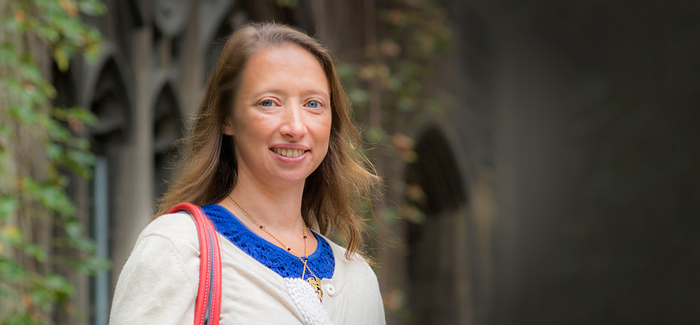
Getting the news about the fellowship was “the biggest surprise of my life. I thought it was a telemarketer calling. It still doesn’t seem real,” Zahra says. “It felt like being struck by lightning, but a particularly good kind of lightning.” (Photography courtesy of the John D and Catherine T. MacArthur Foundation)
Genius at work
MacArthur Fellow Tara Zahra discusses her latest project.
Typically, “we only get together to celebrate funerals,” social sciences dean David Nirenberg told the crowd gathered in Room 122 at the Regenstein Library to celebrate history professor Tara Zahra’s MacArthur Fellowship. “Here, we’re at a birth,” he said, and took a moment to boast about the number of “genius” grant winners in the division, with one in anthropology and five in history. “Economics even has one,” he joked. “They have lots of Nobels, though.”
“I’ve been incredibly anxious about this talk,” Zahra said, six weeks after getting the call that she’d been officially declared—by the MacArthur Foundation—a genius. “I have to keep reminding myself that I’ve already gotten the award, and you can’t take it away.”
After thanking her colleagues, graduate students, and a teacher she had as an undergraduate at Swarthmore College, Zahra discussed her forthcoming book, a history of emigration from East Central Europe to Western Europe and the United States between 1889 and the present, to be published by W. W. Norton in August 2015. The book, she said, shifted her previous focus on children in Eastern and Central Europe in the 20th century to labor, workers, and children and the Reg’s Archives of Czechs and Slovaks Abroad.
As part of the research, Zahra studied an 1889 trial in Wadowice, Poland. In the trial, 65 Jewish travel agents were accused—and convicted—of enticing emigrants into “abandoning” their homeland and delivering them to American mines and brothels for hard labor.
The case, tinged with anti-Semitism, was ultimately a referendum on emigration: Eastern and Central European anti-emigration activists felt that freedom to emigrate was ostensibly a type of slave trade. Political leaders hoped to protect their citizens from falling prey to slave-like treatment in America. At the same time, governments were also concerned about population loss and maintaining “biological quality” of the state’s “human material.” After World War I, many countries allowed police-wide latitude in prohibiting their citizens from traveling. They did allow, however, and even encouraged, people considered less desirable to leave the country, such as through a Nazi plan to resettle Polish Jews in Madagascar.
Eastern European governments’ conflicting views on their citizens’ mobility lasted well into the 20th century. Zahra concluded her overview by suggesting that the erection of the Iron Curtain during the Cold War could be seen as a solution to a “problem” posed in Wadowice: “the culmination of a century-long effort to protect the ‘freedom’ of Eastern Europeans by rendering them immobile.”
Zahra’s full-length article on the trial can be found in the May 2014 Past and Present.
Video
Historian Tara Zahra combines extensive archival research with broad sociohistorical analysis of notions of nation, family, and ethnicity to construct an integrative, transnational understanding of events in twentieth-century Europe.
